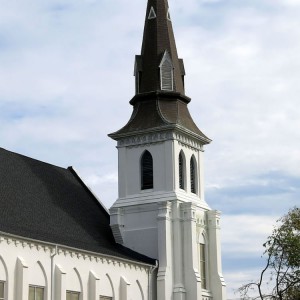By Andy Brack, editor and publisher | The whole notion of forgiveness has been in the front of many people’s minds in the weeks since the massacre at Emanuel AME Church. Just how, they wonder, could family members of the victims, one after another, forgive the accused shooter so quickly after such a reprehensible deed?
![]() One pastor explains forgiving is the natural, almost instinctive reaction of people who live lives based on a deep faith in God. Because of faith, they already feel forgiven for the sins they confess to their maker. When an evil was done to members of their family, forgiveness was a the way for the faithful person to cope and react.
One pastor explains forgiving is the natural, almost instinctive reaction of people who live lives based on a deep faith in God. Because of faith, they already feel forgiven for the sins they confess to their maker. When an evil was done to members of their family, forgiveness was a the way for the faithful person to cope and react.
The act of forgiving, this pastor said, allows those who mourn to feel free of hatred, free of anger, free of bitterness. Instead of spiraling down and succumbing to the evil, they stare it in the face and find solace in what they’ve learned for generations from their families and their churches — to feel free to love, not hate.
For blacks in South Carolina and across the South, forgiveness has been built into day-to-day life, year after year, from slavery and Jim Crow times to civil rights marches and #BlackLivesMatter rallies.
It’s pure New Testament. Jesus Christ taught love and forgiveness, observes the Rev. Joseph Darby, presiding elder of the local AME churches. It’s part of what blacks, often powerless in a patriarchal, plantation society, had to do to survive.
“Black people had to coexist with people who owned them, who could rape, kill or sell them, and the black people couldn’t strike back,” says Darby, a longtime civil rights activist. “Black folk in South Carolina learned to forgive.”
That doesn’t mean that faithful families aren’t angered, saddened or hurting from the violence that took their kin from them. But forgiveness helps compartmentalize the pain — to shove it aside so that love can bloom and heal.
For the victims’ families who worship at Emanuel AME Church and other churches, forgiving is part of faith and love of God. But for those who don’t grow in a religious culture that forgives may have a hard time grappling with the bold, public examples of forgiveness by worshippers at Emanuel AME. The concept of forgiveness may be more abstract, something not as ingrained in daily living. But the tragedy in Charleston is forcing people across the Holy City to confront the intertwining of forgiveness, hate, fear and love.
A new novel by Asheville writer Vally Sharpe may offer some help and warmth to those struggling with faith, reality and forgiveness.
 “The Gospel According to Emily,” is a tender, touching story of a Georgia family with two sons, one of whom is a little different. This son helps people, does good deeds and changes lives as he tries to unburden people of their troubles. The parallels to the story of Christ are familiar and comfortable.
“The Gospel According to Emily,” is a tender, touching story of a Georgia family with two sons, one of whom is a little different. This son helps people, does good deeds and changes lives as he tries to unburden people of their troubles. The parallels to the story of Christ are familiar and comfortable.
In a key passage, Sharpe examines how people can interpret the same incident in different ways, which is instructive for those seeking to better understand forgiveness.
Consider how a guy stuck in rush-hour traffic might react if he were cut off by another driver who slid ahead of him. The enraged driver could speed up — even bump the rear of the driver’s car to get him to pull off the road, which could then escalate into a fight, or even worse — one of them would pull a gun on the other.
But what if, Sharpe wondered, the guy who slid ahead of the other car was lost or made an honest mistake. He might not have even realized that he did something wrong because of the error. If the second guy knew that — instead of assuming malice — the reaction might have been different. Sharpe writes:
“We do it all the time. We focus on scarcity where there is none and by hoarding whatever we think is scarce for ourselves against the day we imagine it will all run out, we bring bona fide scarcity into existence.
“We focus on fear instead of love, on judgment and blame instead of acceptance and forgiveness, on war instead of peace And some, particularly in political circles, do it on purpose, because they know that if you can influence what others think, you can gain control over them. We think of that as power, when it’s yet another illusion because that version of power operates from a place of fear and for good reason. The threat that someone will try to take it away from you is ever-present.
“If you buy into that definition of power, then the only way you can contain your fear is by destroying those you think are out to take it away from you — by influencing others to perceive them as dangerous to them, too. But real power can’t be taken away.”
Forgiving, as Sharpe suggests in the novel that she calls “an imagining,” offers real power that strips away hate and feelings that will destroy. Isn’t that how victims’ families reacted to the Emanuel Nine tragedy?
Andy Brack is editor and publisher of Charleston Currents. You can purchase Sharpe’s book at Amazon.com. Have a comment? editor@charlestoncurrents.com.




 We Can Do Better, South Carolina!
We Can Do Better, South Carolina!
























